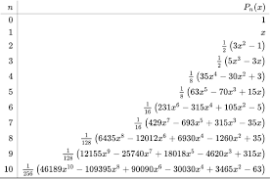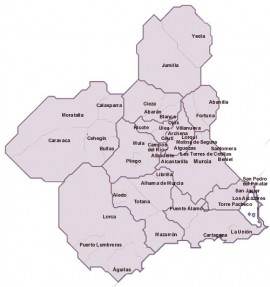- Fecha(s): 20/11/2018
- Lugar: Aula 0.2 del Edificio Torretamarit, Universidad Miguel Hernández de Elche (se grabará)
- Ponente: Francisco Marcellán, Instituto de Ciencias Matemáticas (ICMAT) and Departamento de Matemáticas, Universidad Carlos III, Madrid

The theory of orthogonal polynomials constitutes a nice example of the interplay between classical analysis, numerical analysis, linear algebra, probability theory and mathematical physics. In this talk we will deal with orthogonal polynomials associated with measures supported on the real line with a special emphasis on the situations where they are eigenfunctions of higher order…
- Fecha(s): 05/11/2018
- Lugar: Aulas 0.1 y 0.2, Edificio Torretamarit, Universidad Miguel Hernández (Campus de Elche) (Se grabará)
- Ponente: Jesús Fernando López Fidalgo, Universidad de Navarra

El diseño experimental es la única situación en la que es significativo dentro de la teoría Bayesiana promediar sobre el espacio muestral. Como la muestra aún no se ha observado, se aplica el principio general de promediar sobre lo desconocido. Este marco justifica muchos criterios de optimalidad y abre nuevas posibilidades, por lo que varios…
- Fecha(s): 29/10/2018
- Lugar: Sala de Seminarios del I.U. CIO, Edificio Torretamarit, UNiverisdad Miguel Hernández de Elche (se grabará)
- Ponente: Allan Seheult, Mathematical Sciences, The University, Durham, ENGLAND

A Bayesian method of moments/instrumental variable (BMOM/IV) approach is developed and applied in the analysis of the important mean and multiple regression models. Given a single set of data, it is shown how to obtain posterior and predictive moments without the use of likelihood functions, prior densities and Bayes’ Theorem. The posterior and predictive moments,…
- Fecha(s): 22/06/2018
- Lugar: Seminario de Fundamentos del Análisis Económico, B2/02
- Ponente: Iñaki Permanyer

Abstract: When measuring multidimensional poverty it is reasonable to expect that the trade-offs between variable pairs can differ depending on whether the concerned pairs are complements or substitutes. Yet, currently existing approaches based on deprivation count distributions unrealistically assume that all pairs of variables are related in the same way, an unfortunate circumstance that undermines…
- Fecha(s): 18/05/2018
- Lugar: Seminario de Métodos Cuantitativos para la Economía y la Empresa. Facultad de Economía y Empresa. Se retrasmitirá on-line
- Ponente: Karoon Suksonghong (Burapha University)

Abstract This paper models the inbound tourism demand of Thailand by focusing on six major tourism markets, including China, Malaysia, South Korea, Japan, Russia, and India. Several economics variables widely used in the demand modeling literature were adopted. Besides, additional variables pertaining to environmental and security aspect were considered and incorporated into our investigated model….
- Fecha(s): 19/04/2018
- Lugar: Seminario del Departamento de Métodos Cuantitativos para la Economía y Empresa, UMU. Retransmisión en directo.
- Ponente: Xesús Pereira López. Universidad de Santiago de Compostela

En el ámbito de la generación de tablas input-output regionales, se ha visto como la formulación de los cocientes de localización –desde las propuestas incipientes hasta la fórmula aumentada de Flegg– ha sufrido cambios. Ahora bien, las distintas modificaciones presentan cierta sencillez; en donde las tasas de variación del empleo o producción, así como el…
- Fecha(s): 29/09/2017
- Lugar: Seminario del Departamento de Métodos Cuantitativos para la Economía y Empresa, UMU. Retransmisión en directo.
- Ponente: Mª de Mar Sánchez de la Vega. Universidad de Murcia

The aim of this work is to propose a statistical methodology in order to estimate the macromagnitud Gross Value Added per capita (GVApc) in the local geographical area. The procedure proposed consists of estimating a panel model which includes Griffith’s spatial filtering (1996, 2000) to capture the spatial dependence in the whole analyzed period. The…
- Fecha(s): 11/07/2017
- Lugar: Sala de Seminarios (Edificio Torretamarit), Universidad Miguel Hernández (Campus de Elche) . Se grabará.
- Ponente: Magdalena Kapelko, Wroclaw University of Economics, Institute of Applied Mathematics, Department of Logistics

Abstract This paper extends the measurement of dynamic productivity change over time to provide its full decomposition into economically meaningful components in the Data Envelopment Analysis framework. The dynamic approach accounts for dynamics of production decisions via adjustment costs and is visualized as a dynamic Luenberger productivity change indicator. The paper also estimates the dynamic…
- Fecha(s): 16/06/2017
- Lugar: Sala de Seminarios (Edificio Torretamarit) UMH (Se grabará)
- Ponente: Priscila Lopes, Universidade Federal do Rio Grande do Norte, Natal (Brazil)
- Porconfirmar: 1
Brazil is proportionally a relatively unimportant player in the world fisheries scenario. However, small-scale fisheries (SSF) specifically are crucial for local livelihoods and the food security of millions of people, both on the coast and inland. Such fisheries provide more than 50% of the total Brazilian catches, suggesting that they can be highly impacting on…
- Fecha(s): 26/01/2017
- Lugar: Seminario del Departamento de Métodos Cuantitativos para la Economía y Empresa, UMU. Retransmisión en directo.
- Ponente: José J. García Clavel, Universidad de Murcia

Abstract: Due to the presence of duality, cluster analysis has been proposed to analyze Total Information Analysis super distance matrix instead of a row-column joint graph. But the same duality causes that the traditional methods of clustering are not always capable to produce meaningful results. In this paper following Nishisato (2014), the clustering with p-percentile…









